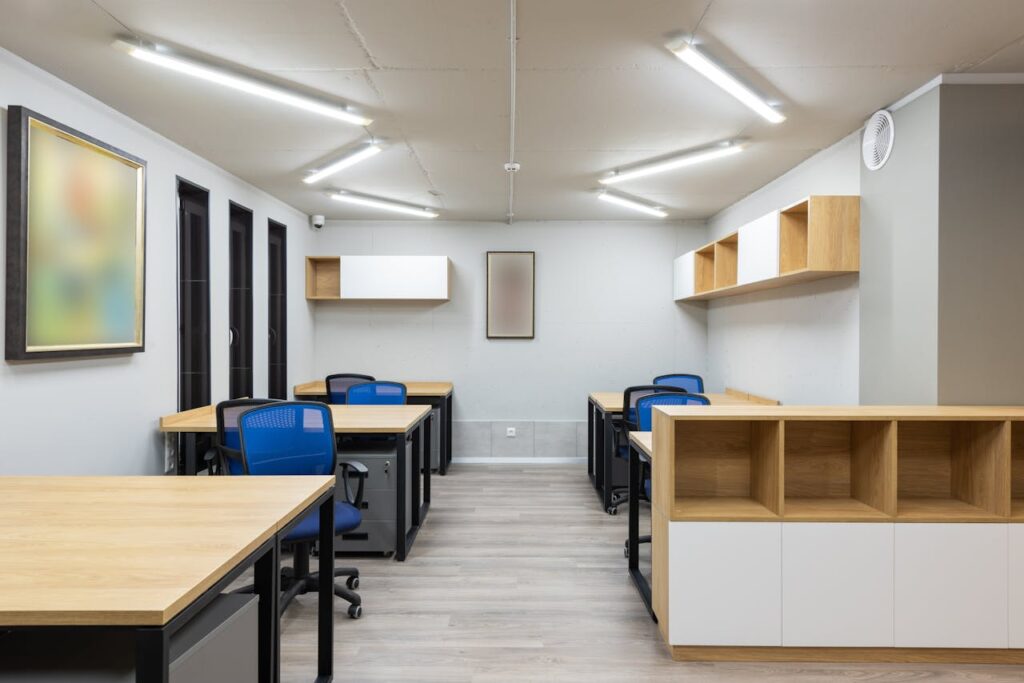Securing the ideal office space is critical for a small business’s growth and efficiency. Whether launching a startup or expanding operations, the right workspace can foster productivity and professionalism while supporting future growth. Carefully evaluating key factors such as location, budget, and amenities ensures a decision that meets both current needs and long-term objectives. So, how do you find the best office space for your small business?
Why Choose a Dedicated Office Space?
A dedicated office space offers unparalleled focus and productivity. Unlike shared or home offices, it eliminates distractions and supports a professional work environment. This setup enhances efficiency by fostering an atmosphere where tasks receive undivided attention.
Additionally, a private office elevates a business’s image. It provides a credible address for correspondence and a professional space for hosting clients. These elements contribute to building trust, legitimacy, and long-term relationships. Moreover, such spaces often come with manageable overhead costs, making them a practical choice for small businesses.

The 5 Key Factors in Choosing Office Space
1. Location and Accessibility
The office location significantly impacts business operations. It should be convenient for employees, clients, and suppliers. A space with accessible transport links, parking options, and nearby amenities like eateries can enhance daily operations. Consider the surrounding area’s safety and reputation, as these factors can influence perceptions of the business.
2. Budget and Expenses
Choosing a space within the financial plan ensures sustainability. In addition to monthly rent, account for utilities, internet, and maintenance costs. Understanding all financial commitments helps avoid unexpected expenses, allowing funds to be allocated to other critical areas of the business.
3. Space and Layout
The office layout should align with the business’s current needs and accommodate future growth. Evaluate the number of employees, the type of work performed, and requirements for additional rooms. Opt for a space that can adapt as the business evolves, reducing the need for frequent relocations.
4. Amenities and Services
Identify essential amenities for daily operations, such as high-speed internet, meeting rooms, and furniture. Some spaces offer reception services or communal facilities, which can add value. Prioritize these features based on necessity to avoid overpaying for extras that don’t add meaningful benefits.
5. Lease Terms
Carefully review lease agreements to ensure flexibility and favorable conditions. Look for terms related to duration, renewal, and termination policies. Understanding lease clauses reduces risks and clarifies obligations and rights as a tenant.
Types of Office Spaces for Small Businesses
Executive Suites
Executive suites provide fully equipped offices ready for immediate use. These spaces often include furniture, internet, and reception services. This option suits businesses needing minimal setup and seamless functionality.

Private Offices in Coworking Spaces
Coworking spaces frequently offer private offices alongside shared areas. These provide a balance of privacy and access to collaborative zones. Networking opportunities with other professionals can also be a valuable advantage.
Virtual Offices
Virtual offices allow businesses to establish a professional presence without a physical workspace. They typically include a business address, mail handling, and meeting room access. This solution works well for businesses needing occasional physical space while operating remotely.
5 Strategies for Finding the Ideal Office Space
1. Define Clear Requirements
Establishing priorities simplifies the search process. Consider location, size, budget, and required amenities to narrow down options efficiently.
2. Use Online Platforms
Online platforms such as Regus, LiquidSpace, and WeWork provide detailed listings with filters for specific needs. These tools make exploring options convenient and time-saving.
3. Seek Professional Guidance
Commercial real estate agents offer expertise and access to exclusive listings. They assist in negotiations, ensuring competitive terms and an optimal deal.
4. Visit Shortlisted Spaces
Physical visits help assess each space’s condition, layout, and suitability. Use these visits to evaluate practical aspects, including lighting, ventilation, and security features.
5. Negotiate Favorable Terms
Negotiation can lead to lower costs or added benefits, such as flexible leases or included utilities. Advocacy during this phase can yield substantial advantages for the business.
Maximizing Small Office Space
Designing an efficient layout enhances productivity and comfort. Arrange desks and storage to create an organized and ergonomic workspace. Adding personal touches, such as decor or plants, fosters a welcoming atmosphere without compromising professionalism.
Investing in technology ensures operational efficiency. High-speed internet, reliable devices, and essential software streamline workflows. Maintaining cleanliness and organization also helps sustain a productive and pleasant environment. Encouraging collaboration and positivity among team members can further elevate workplace satisfaction.

